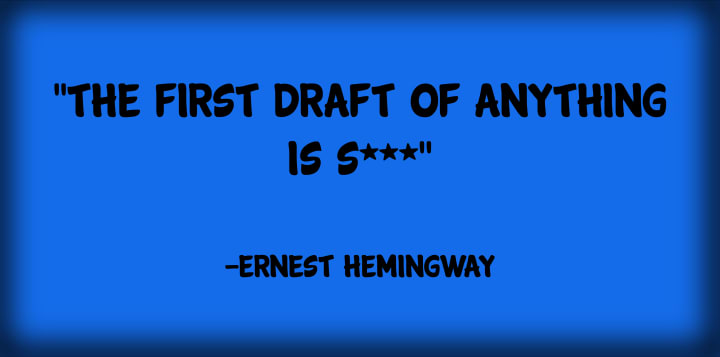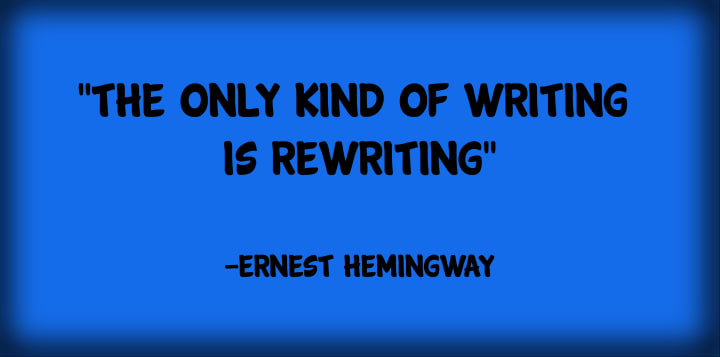Writing The First Draft
(And Why It’s Okay That It Sucks)


“The first draft of anything is s***”
I didn’t know who said this for a long time, but doing a bit of digging around the web led me to discover it can be attributed to Ernest Hemingway, a famous American novelist who passed away in 1961. For me, I first heard this quote during my screenwriting course at uni, and it’s stuck with me since.
Before this quote, I thought the first draft needed to be perfect (or close enough). I felt additional drafts were just me tidying up – dotting a few i’s and crossing some t’s. When I would leave my work to simmer and come back to it, I found I didn’t like what I was reading. I felt I wasn’t doing a good enough job and this gave my confidence a hit. I thought maybe I wasn’t cut out to be a screenwriter. But the first draft is not a be-all end-all indicator of writing quality.
This leads me to another quote, also by our friend Hemingway.

“The only kind of writing is rewriting”
I cannot understate how absolutely true and accurate this quote is. It completely and succinctly embodies actual writing. The first draft is merely the framework, a rough draft. It’s essentially throwing up all your thoughts on to the paper. Once you have those thoughts down, once you have that framework, only then can you actually refine and perfect it. The biggest part of writing is the multiple drafts that together lead to that refined, ‘perfected’ point.
Today, I know the first draft of anything I write isn’t very good. But knowing this detail is what keeps me pushing through. I know that to get to where I need to get to, I need that first draft done. Then the second draft. Then the third. And so on. Even with this blog post, I went through all the motions of a first draft. I knew it wasn’t very good at the initial draft stage. It was frustrating, but I pushed through because that’s what you need to do.
Just recently I finished the first screenplay draft for Highton Heroes Season 1. That’s 10 episodes of about 25-30 pages each. Writing a whole TV series isn’t at all normal. Even those who are successful usually only write a pilot to get greenlit. But, as you should know by now, I’m writing these screenplays because I enjoy it and because I want the full stories down on paper, even if they never get made.
Planning is a huge part of writing before you even write the first draft. What this planning actually entails varies from writer to writer. And on top of that there are, of course, differences between planning for screenplay writing and planning for novel writing. For me, I take some personal approaches guided by the process presented by Syd Field in his popular book, Screenplay.
For each screenwriting project, I generally use the following steps.
- I write an in-depth Info Book that explores the world, historic events, factions, technology and any information that might be relevant to my script.
- I write 3+ pages on each main character and then boil this down into a ½ page summary in the Info Book.
- I write a story plan detailing the key points for the story and the premise, as well as each Act in 14 plot points. Some might use what is called a beat sheet around this point in the planning phase.
- I then expand these plot points into a treatment, usually it dot-point form. Basically an outline of the entire story.
- Next, I turn this treatment into a scene plan (basically the screenplay but with each scene described instead of written under each scene heading, no dialogue).
- Then, hopefully, I’m ready to write the first draft into screenwriting software like Final Draft… And it still turns out like crap.
Like any creative, I’m always working to refine my scriptwriting journey. Sometimes it works out, sometimes it doesn’t. For instance, I did make a change for Highton Heroes Season 1. I figured with so many episodes to write that I might skip the scene plan stage. I went straight from the treatment into writing the initial draft for each episode. This turned out to be a mistake.
Without the scene plan, I found myself getting stumped more frequently as I hadn’t dedicated as much thought to how events would play out. I found myself inadvertently riddling the draft with more inconsistencies than usual. In effect, this move has made the first draft of Highton Heroes Season 1 much rougher than my first draft of Nash I (there are other reasons for this too).
“Why does all this planning matter if your early draft sucks anyway?”, you might ask? Well, while I accept the initial draft is always rough, the goal of planning is to make it less rough. Less rough means you build a better framework to build off for the second draft. It might even mean less subsequent drafts in the long run to ‘perfection’.
Another question you might ask. Why do I keep putting ‘perfection’ in brackets like that? Because nothing is perfect, not even a great screenplay. Writing is rewriting. The sixth draft is most likely better than the third, but the tenth draft will likely be better than both of them. Even a screenplay that is made into a feature film won’t be perfect. An extra draft might’ve helped make for a better film and, either way, changes will be made during production and the screenplay will go through revisions.
The danger of ‘writing is rewriting’ is that it suggests the writing process is never done, and it kind of never is. But even though you’ll never achieve the impossible goal you wish you could reach – perfection – you can’t let that deter you from writing. Writing is rewriting, but there is a point where you have to be content.
So I guess, to summarise, the two lessons I learnt about writing that stuck with me the most:
- The first draft won’t be perfect, nor can it be. Yes, you want to get it as solid as you can through planning, but being solid doesn’t make it good. It’s a framework. It is the beginning of the writing journey.
- Writing is rewriting. The first draft is the framework, but that doesn’t mean the second draft is the end. It will take many drafts to achieve a good story. That said, don’t get lost writing 400 drafts in search for perfection. Perfection is impossible and you need to reach a point of contentment.
With Highton Heroes Season 1’s first draft complete, I now get to move on to the fun nitty gritty rewriting stage. I have no clue how many drafts it will take until I’m content, but I wager it will be more than Nash. Speaking of Nash, I’ve completed Draft 6 of the first film. Soon I will receive feedback which will probably see me evolve it forward a couple more drafts (maybe more).
What do you think about the first draft? Do you agree with how I see it, or do you have a completely different perspective? I’d be keen to learn more! Especially from any fellow writers out there.
As always, happy to talk about it in the comments or my socials!
Til next time,
Dean
About the Creator
Space & Lasers
I'm a free-time sci-fi writer keen to share my work, discuss my inspirations and just talk about writing in general.
All blogs were originally posted on my website. You can find my site here: https://spaceandlasers.com/






Comments
There are no comments for this story
Be the first to respond and start the conversation.